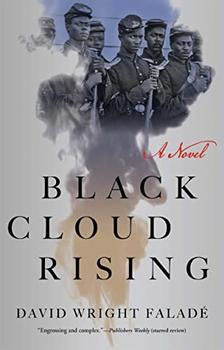Summary | Excerpt | Reading Guide | Reviews | Beyond the Book | Readalikes | Genres & Themes | Author Bio

Excerpt
It was late November 1863, the Wednesday before the feast day recently proclaimed by President Lincoln for giving thanks for the blessings of fruitful fields and healthy skies. We were aboard the Union steamer Express, pushing down the North Landing River, headed for a farm in the neighborhood of the Princess Anne Courthouse. I figured our paddle-wheel's daybreak passage to be about as welcomed by the Virginians living along the shore as the oaths of loyalty that each of them had lately signed his name to. Such was the price of occupation.
And once the lot of us colored troops spilled out onto their docks? Why, I expected they'd find this boatload of musketed Negroes a mite disquieting. And bully for their distress.
"What you knowing?"
I'd not heard Fields Midgett's approach over the spsh-spshspshing of the wheel on the water.
"Is it wise, do you think," said my old friend, "for a Negro garbed in Yankee blue, with sleeves festooned with sergeant's stripes, to linger atop-deck a Yankee steamer as it steams through Secesh territory?"
He was right, of course. Adrift in memories of long-ago times, I'd allowed myself to drop my guard. This was nothing of the behavior of good sergeanting that I was being taught.
"Well, this is officially Union territory now," said I by meager way of excuse.
"Any Rebby-boy with a musket, be he regular, irregular, or mere passerby, would find a fine target of you."
"I expect so," I said. "But only after leveling his best aim at the general."
Fields turned to where I was indicating with my chin.
A-forecastle, at the very tip of the steamer's advance, stood General Wild, stiff and tall, red-whiskered and red-haired beneath his slouch hat, the one arm left him after South Mountain crooked behind his back. A ship's prow has rarely worn a more striking figurehead.
"Ain't that something?" said Fields. He turned back to me. "I mean it seriously, Richard. Ain't that white man something, standing out there, a more prized target than even you?"
Sunrise had peeped early for late autumn, and with the brightening day, the wall of bog birch and oak began to emerge as more than merely shadows, revealing a spray of leaves going to russet with the turning weather. Fields and I settled in at the rail of the Express and surveyed the line of trees along the shore, as though aforehand spotting the muzzle flash of the shot meant to fell the general might somehow forestall the ball. Not a soul in sight.
"What you worrying on?" Fields said over the racket of the wheel. "Still troubling over our leaving to join up?"
Since we were boys, he had always seemed a right clairvoyant at divining my thoughts.
"Not the joining," said I. "That was right."
Just a few months into the war, Union bluecoats and Confederate butternuts from inland had faced off at Hatteras Inlet, then set to racing up from there, intent on capturing the Sand Banks. A string of long, thin islands wedged between the Atlantic and the broad Pamlico Sound, the Banks seemed as remote from the mainland South as it was from the far-off North, but it was prized by both, on account of our distinction as a linchpin of shipping. The Union boys won the contest and soon overran Roanoke, which Fields and I hailed as our home. We Island colored celebrated Jubilee that night. An army recruiting officer gave the call for Negroes a few months after, and Fields and I signed on together right then.
"No, not the joining up," I repeated. "The leaving part, though, is a hole that seems bent on filling itself in with chance memories."
The lowing of some beefs, just beyond the trees, turned our attention that way.
I said, "It reminds of home, doesn't it?"
"It ain't nothing like there!" said Fields. "The Sand Banks is all sand. This here is stretches of crops and peopled farms."
Excerpted from Black Cloud Rising copyright © 2022 David Wright Faladé. Used by permission of Atlantic Monthly Press, an imprint of Grove Atlantic, Inc. All rights reserved.
Your guide toexceptional books
BookBrowse seeks out and recommends the best in contemporary fiction and nonfiction—books that not only engage and entertain but also deepen our understanding of ourselves and the world around us.